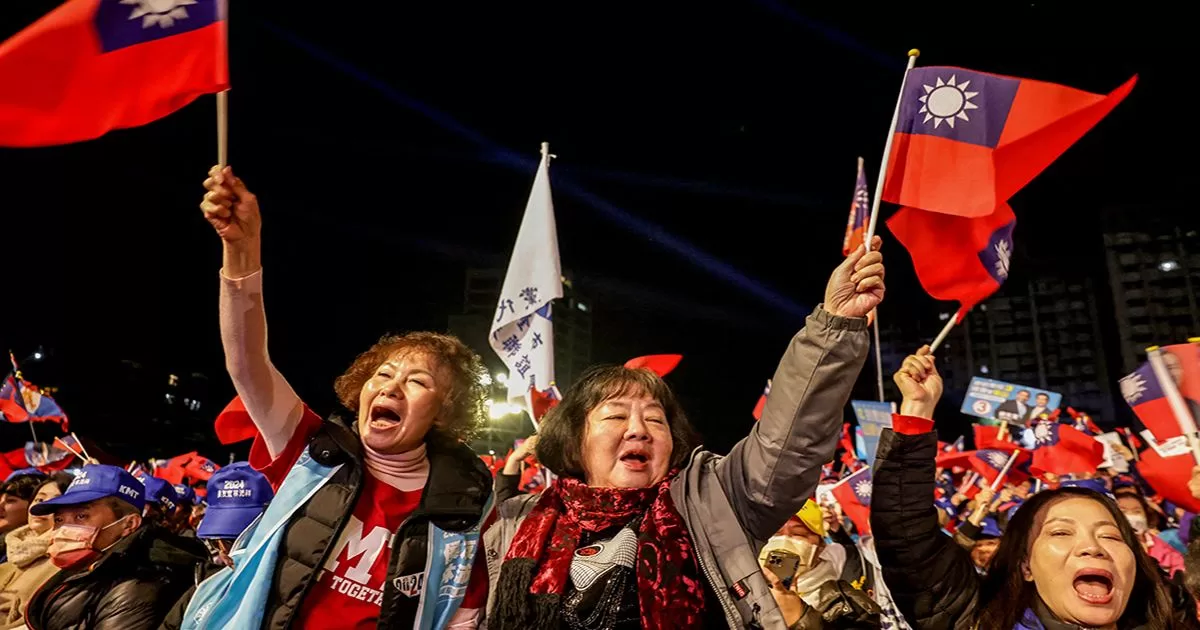Nearly 20 million voters go to the polls on January 13 in Taiwan, in a presidential election that, according to analysts, will be “crucial” for the future of the Asian island nation and its relations with both China, the United States and the rest. of the world.
Context
The Republic of China was originally established in Beijing on January 1, 1912, after the fall of the last imperial dynasty, but three decades later the divergence of ideas led to a civil war and communist rebels took power.
In this way, the Chinese Nationalist Party or Kuomintang, which presided over the Republic of 1912; It was established on the island of Taiwan under the command of General Chiang Kai-shek.
Since then, mainland China has been eager to invade Taiwan. Each of Beijing’s dictator leaders, from Mao Tse-Tung to the current Xi Jinping, has promised to “reunite” Taiwan, by force if necessary.
However, the detente in international relations and warnings from the United States and other powers appear to have prevented the assault by an army that is much larger than Taiwan’s military strength.
To this day, the official name of Taiwan is the Republic of China, which should not be confused with the official name of mainland China, which is the People’s Republic of China.
“Today, only 13 countries in the world recognize Taiwan as a sovereign nation, although it maintains official trade relations with many,” journalist Kelu Wu, who is closely following the presidential elections in Taiwan, told DIARIO LAS AMÉRICAS.
In fact, Taiwan even belonged to the United Nations until 1971, when the international entity chose to accept the inclusion of China in exchange for the island’s departure.
“When the United States established diplomatic relations with the government of China, relations between Taiwan and the United States were modified to ‘unofficial and informal’ in 1979,” recalled the communicator and political specialist.
However, “Washington maintains a clear correspondence with Taipei, its economy and its security,” he stressed.
Positions
Taiwan is known for its colorful election campaigns with lively rallies and cookouts everywhere.
“The two main political parties generally represent opposing perspectives on how to deal with China,” the journalist explained.
“The Democratic Progressive Party (DPP) is the current ruling political group, with President Tsai Ing-wen, and its presidential candidate is the current Vice President Lai Ching-te,” he noted.
Generally speaking, the DPP is committed to affirming a stronger Taiwanese identity and maintains that the danger from China “can be mitigated by deepening partnerships with other nations,” he noted.
On the other hand, the presidential candidate of the opposition party Kuomintang (KMT) “is the mayor of Taipei, Hou Yu-ih. Hou, who presents these elections as a choice between war and peace, and maintains that greater military strengthening and diplomatic and economic interaction with Beijing can maintain peace,” said the political specialist.
There is a third electoral option, the so-called Taiwan People’s Party (TPP) with the former mayor of Taipei, Ko Wen-je, which “presents itself as an alternative to two-party rule, and that message has resonated with some younger voters that promises more dialogues with Beijing, while proposing a heightened defense posture to accompany its own plan for greater dialogue,” he added.
Other issues
Taiwan is known in Asia as one of the countries with the best democratic system. “Freedom of expression, including the press and political groups, are widely respected,” said the journalist.
And that is why “everything is talked about and raised,” he stressed.
In addition to the danger of an invasion, occupation and dictatorial subjugation, there are other issues that are addressed in this electoral campaign.
With a low unemployment rate, around 3.3%, Taiwan suffers from other situations, such as relatively low wages, high housing prices, energy security and aging population, etc.
USA
The elections in Taiwan have implications for the United States, which officially adheres to the ambiguity of what it calls “the one-China policy,” which recognizes China’s claim to Taiwan while fearing invasion.
In recent years, the rivalry between the United States and China has encouraged many in Washington to show support for Taipei as a way to confront Beijing.
When then-House Speaker Nancy Pelosi visited Taiwan in 2022, the highest-ranking US official to visit the island in 15 years, China protested and dramatically increased military exercises around Taiwan.
While the United States offers military aid to Taiwan, it is unknown what Washington’s response would be to a Chinese invasion.
Just a few days ago, the Chinese ruler told US President Joe Biden that “he will reunify Taiwan with mainland China, but he has not yet decided on the timing.”
How and when it would carry out what it calls reunification is a big mystery, to which the Biden administration responds with a $106 billion supplemental aid bill for Ukraine, Israel and Taiwan that is stalled in the Senate.
On the other hand, Taiwan, which has a highly developed economy, is a center for several key industries.
“The main one is the manufacturing of semiconductors, the crucial elements of computer chips. The Taiwan Semiconductor Manufacturing Corporation alone manufactures more than 90% of the most advanced processors,” the journalist noted.
Disrupting Taiwan’s sovereignty could cripple international supply chains and put untold billions of dollars in companies and businesses around the world at risk.
Generally speaking, “the United States would also be deeply interested in the continued success of democracy in Taiwan, in the face of China’s autocracy,” he stressed.



